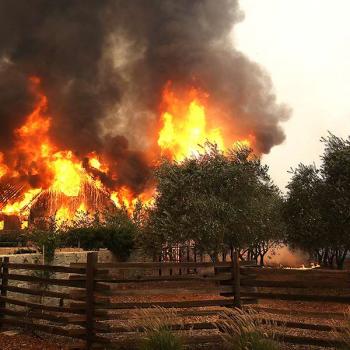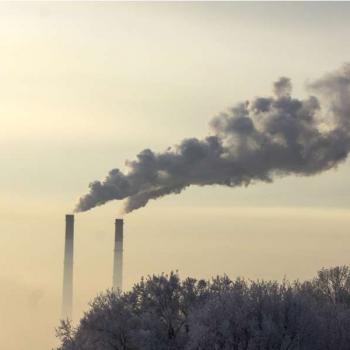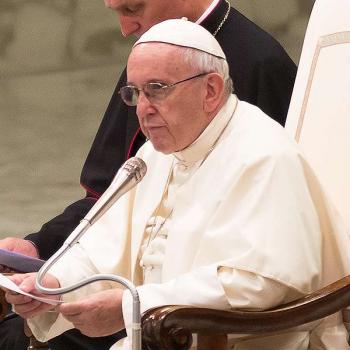Santa Rosa, Calif., Oct 12, 2017 / 03:01 am (CNA/EWTN News).- While firefighters in northern California are currently battling 17 wildfires in five counties, Bishop Robert Vasa of the Diocese of Santa Rosa, one of the hardest hit areas, is typing updates and messages of support from his car, in between visits to evacuation centers. “Our diocese has been hit hard, as you know well, and is in an ongoing state of uncertainty,” he said in his Tuesday message. The fires, made worse by dry conditions and unrelenting winds, have already scorched at least 100,000 acres and have killed at least 21 people since the beginning of the week. Thousands more have been displaced, their homes and businesses destroyed. Much of the area of the Diocese of Santa Rosa has been under mandatory evacuation, including the chancery and the local Catholic Charities office. One of the diocese’s Catholic high schools has been almost completely destroyed by a fire, and an elementary school has sustained significant damage. “Most of our parishes are fine,” Bishop Vasa wrote. “The one exception is Cardinal Newman High School and Saint Rose elementary which share a campus.” A “significant portion” of the high school was destroyed, he noted, along with the preschool building and the roof of the elementary school. Graham Rutherford, principal of Cardinal Newman High School, sent a letter to parents and students, assuring them that all students and staff had been accounted for and were safe, and asked them to respect the evacuations and not go near the campus until officials have given the all-clear. “Thank you for the many kind and generous efforts made by countless members of our community to help each other and to help others in this hour of need,” he added. “We are proud to see our school year motto, ‘One School: Undivided’ lived out with such compassion.” Bishop Vasa also noted that he has visited several evacuation centers and spoken with many people whose homes and businesses have been destroyed. “The sense of great helplessness is palpable,” he wrote. “When people ask how they can help I answer that I really do not know. I do know that prayers are the greatest source of solace and help.” In his Wednesday message, he offered his prayers for those who had lost loves ones in the fires. “We pray for your consolation and for eternal rest for your lost loved ones. Our hearts go out to all of you,” he said. “At the same time, we acknowledge the sense of loss and suffering experienced by those who have lost their homes, or businesses, or places of employment. We pray that you do not lose hope, nor the sense of God’s presence and ultimate goodness. You must know that the hearts of the entire community, though it can neither feel what you feel, nor undo the loss, do go out to you.” He also thanked the firefighters and police, both those from California and throughout the country who have offered their help. “...I commend you for that patience and professionalism which I have seen so often and for which I commend you. As I very often advise. Persevere!” he said. “Thousands of volunteers are spending countless hours showing their desire to share in the suffering of those displaced by the fire. Thank you. Thank you. Thank you. My prayers are with all of you as well.” Christopher Lyford, director of communications for the Santa Rosa diocese, stopped by St. Eugene's Cathedral, which is being used as an evacuation center coordinated by the Marian Sisters of Santa Rosa and other parishioners. Once there, he found a homeless man doing his best to comfort the distraught evacuees. “A homeless man named Paul, who lives near the cathedral in a creekbed, happened by and offered some consolation through his gift of music” by playing the piano inside the shelter, Lyford told journalists. “The poignancy of the moment is not lost.” Father David Jenuwine, Parochial Vicar of St. Apollinaris Catholic Church in Napa, California recounted some of his own experiences with the fires in e-mail comments to CNA in between helping out at evacuation centers. On Monday, the first day of the fires, Jenuwine said he started smelling smoke around 4 a.m. and realized the area had lost power. “When I figured out what was going on, I exposed the Blessed Sacrament around 5:00 am and started praying. People started showing up for morning Mass at 6:15 am. I went inside (again still dark - no power), and got ready for Mass” he said. “Mass in complete darkness, knowing your friends and parishioners are in jeopardy, is an awe inspiring experience. The prayers took on an eminence and an importance,” he said. The verse that “jumped from the page” of the day’s readings was: “Who is my neighbor?” “I spoke briefly about that verse, and how that would be our clarion call for the next several days,” Jenuwine said. “Because without limit, right now, EVERYONE is our neighbor.” Over the next two days, he said, the parish started taking in evacuees from the area and accepting food donations. “The faces of the donors and the recipients reflected a surreal joy. Giving and receiving are both opportunities to share in the divine life of the Most Holy Trinity. And it is apparent in what we have witnessed over the past few days,” he added. As of today, access to power and communications are back, but the fires are still far from contained, Jenuwine noted. “I have to cut this short, because I’m needed at the Red Cross shelter to comfort those who have lost someone in the fires. Pray for us,” Jenuwine said. “Many parishioners have lost everything. The overwhelming feelings of the loss of so many is offset by the overwhelming generosity of individuals giving food, bedding, clothes, and water.” “Pray for us,” he added again. “Pray that the winds die down, and the fires can be abated. Pray that we have strength to persevere.” Fr. Jenuwine’s parish has set up a Paypal donation page that is acting like “a rolling second collection” for fire relief, though Father noted the immediate issues of evacuations, shelter, food and water were being addressed before the exact recipients of the relief money could be determined. Updates from Bishop Vasa and the Diocese of Santa Rosa can be found on the diocesan website as well as the diocesan Facebook page. Read more




















